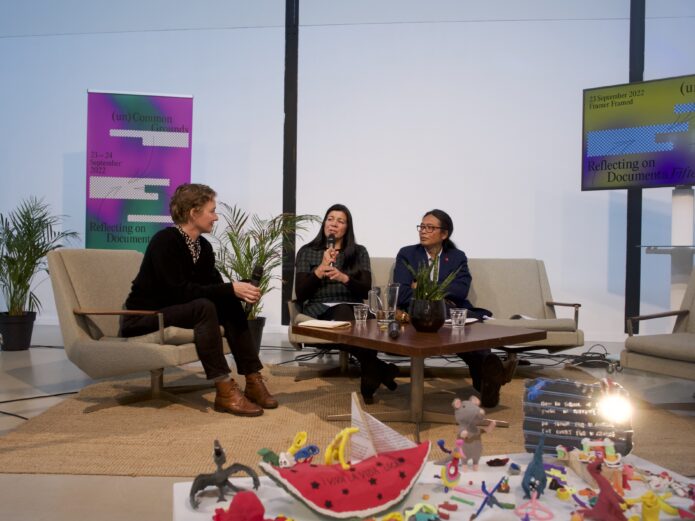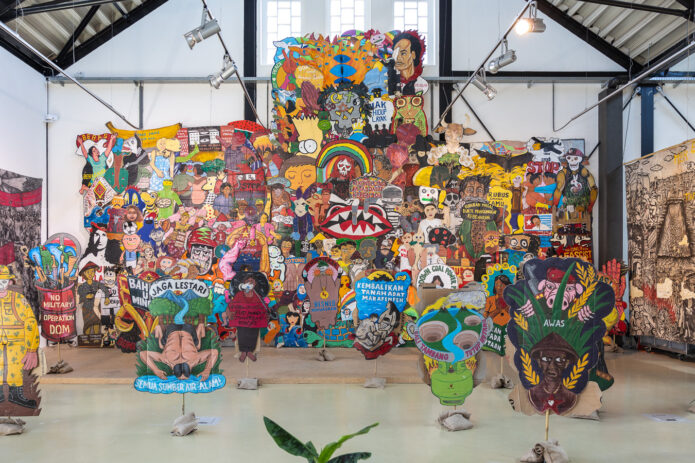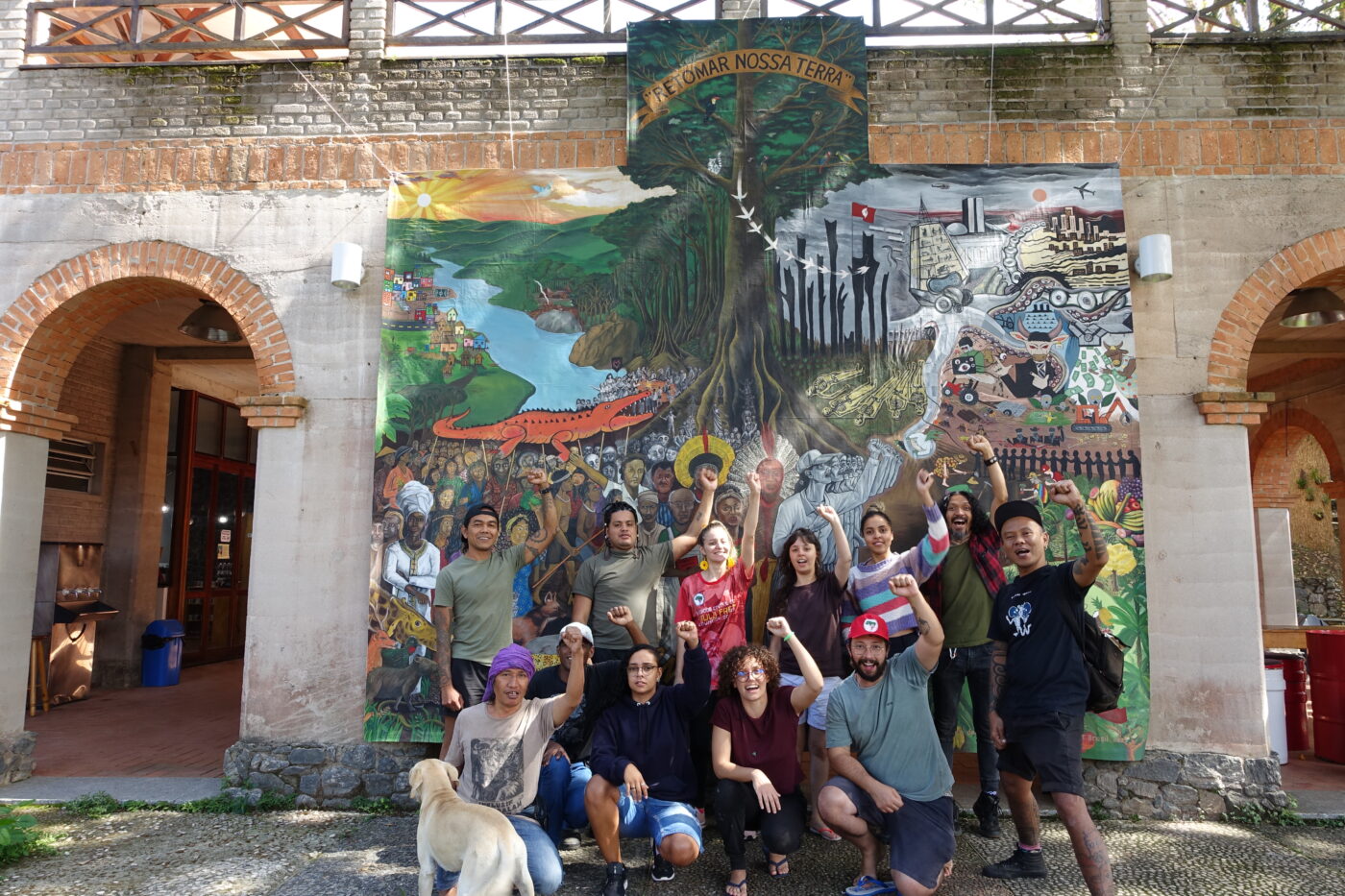 Taring Padi's Wayang Kardus workshop at Florestan Flores National School in Brazil (2023), with on the background the newly produced work 'Retomar Nossa Terra / Rebut Tanah Kita' (2023). Photo: Taring Padi
Taring Padi's Wayang Kardus workshop at Florestan Flores National School in Brazil (2023), with on the background the newly produced work 'Retomar Nossa Terra / Rebut Tanah Kita' (2023). Photo: Taring Padi Seeking Restorative Processes by Benjamin Seroussi
In anticipation of their exhibition Tanah Merdeka, Taring Padi partnered with Framer Framed, Brazilian Jewish cultural centre Casa do Povo and Movimento dos Trabalhadores Rurais Sem Terra (MST) for an artist residency at the Escola Nacional Florestan Fernandes do MST in São Paulo, Brazil. The residency, entitled Rebut Tanah Kita, or Reclaiming the Land, featured collaborative workshops to create a large banner addressing themes related to land use, agrarian reform and colonisation. Artistic director of Casa do Povo, Benjamin Seroussi, reflects on Taring Padi’s experience at documenta fifteen and their stay in Brazil in this text from the exhibition catalogue of Tanah Merdeka.
Text: Benjamin Seroussi
Seeking Restorative Processes
Many asked us: why would Casa do Povo, a Jewish institution, invite an Indonesian collective that was accused of antisemitism during documenta fifteen for an artistic residency? We typically respond to this question with another one: who better than a Jewish Institution to do this? In this particular instance, it is not just any Jewish institution, as Casa do Povo had already been working with the artistic team of documenta fifteen prior to the event’s opening. In fact, Taring Padi paved the way for our invitation to happen. Their apologies and almost immediate taking down of the panel with antisemitic figures was a clear acknowledgement of what had transpired. It was enough for us to engage with them in a restorative conversation about antisemitism and other issues. Framer Framed offered the perfect context – the production of a new work – and financial conditions to make it all possible.
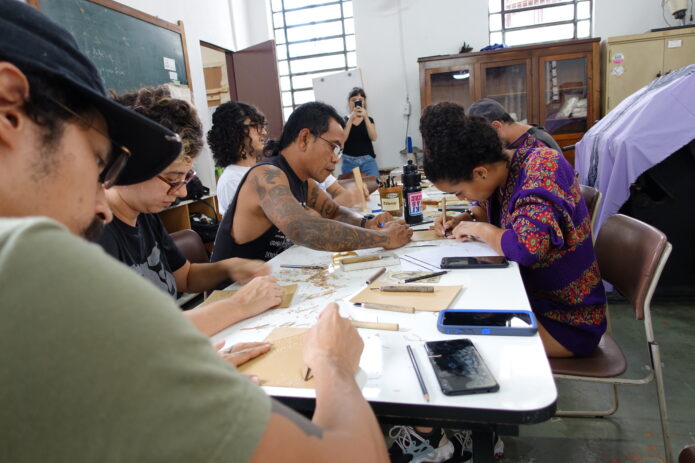
Taring Padi’s Wayang Kardus workshop at Florestan Flores National School in Brazil, April 2023
As a place that works with contemporary art, Casa do Povo couldn’t limit itself to a distant critical analysis of the images produced during documenta fifteen; it needed to meet with the artists who had produced these images. The fight against antisemitism, racism, transphobia and many other forms of oppressions cannot be done solely through denunciations and cancellations. It is fundamental to seek out restorative processes as well. We know such dynamics are often lengthy (and sometimes frustrating), but they are also catalysts for transformation. Few people will openly declare themselves as antisemites or racists, but that doesn’t mean they cannot behave as such. None of us is entirely free from prejudice. Therefore, it is more important to focus on understanding how antisemitism operates, its impact, and how to combat it, rather than merely identifying individuals who are perceived as holding prejudiced beliefs. Additionally, one must also be aware of the instrumentalisation of this struggle by conservative agendas – as it has happened in documenta fifteen when the rightful stand against antisemitism was used to silence many artists and the exhibition as a whole.
The time we spent in Brazil with Taring Padi was fruitful. The residency functioned as a safe zone where we had the chance to engage in friendly conversations about delicate issues such as antisemitism and its history, the differences between the nation state of Israel and diasporic Judaism, the Suharto dictatorship, colonialism, and the common struggles for land in Brazil and Indonesia. All this was done as Taring Padi was working and hanging out – what documenta fifteen called “nongkrong” – with MST members. One year later, we do not think that all the issues have been resolved, but we bonded, formed connections and somehow managed to move forward together.
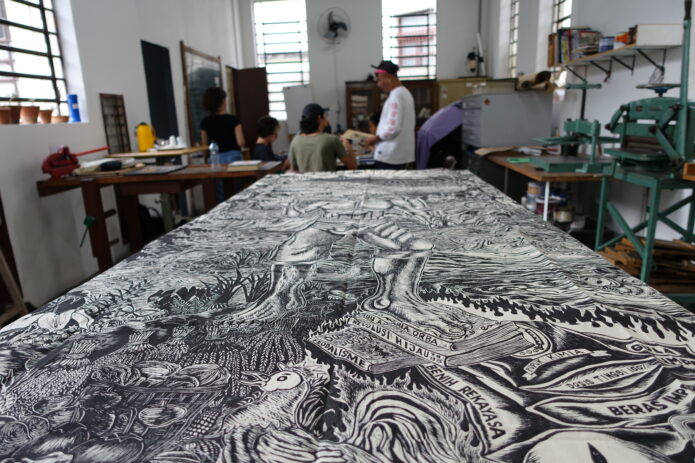
Taring Padi in residency at Casa do Povo. Image courtesy of Taring Padi.
The art world should not be reduced to be an endless series of shallow celebrations. Sufficient time should be given to open-ended initiatives such as this residency. Cultural gaps, language misunderstandings, and idiosyncratic histories are part of our reality. It is always painful when someone initially doesn’t grasp what you are trying to say, or when your pain is just not acknowledged. However, in a globalized and often dully homogenized world, such challenging encounters (and misencounters) also serve as a sign that there are still many radically different worlds out there. As we reflect on this experience, we hope it can help tackle other connected struggles with greater empathy in order to go deeper into discussions about the production and reception of art, the representation of the other, and the fight against all forms of oppressions.
Benjamin Seroussi
Artistic director, Casa do Povo
- English website of Movimento dos Trabalhadores Rurais Sem Terra (MST)
- Portuguese website of Movimento dos Trabalhadores Rurais Sem Terra (MST)
- Casa do Povo - São Paulo
Links
Collectives / Curatorial Text / Indonesia / Colonial history / Art and Activism /
Exhibitions
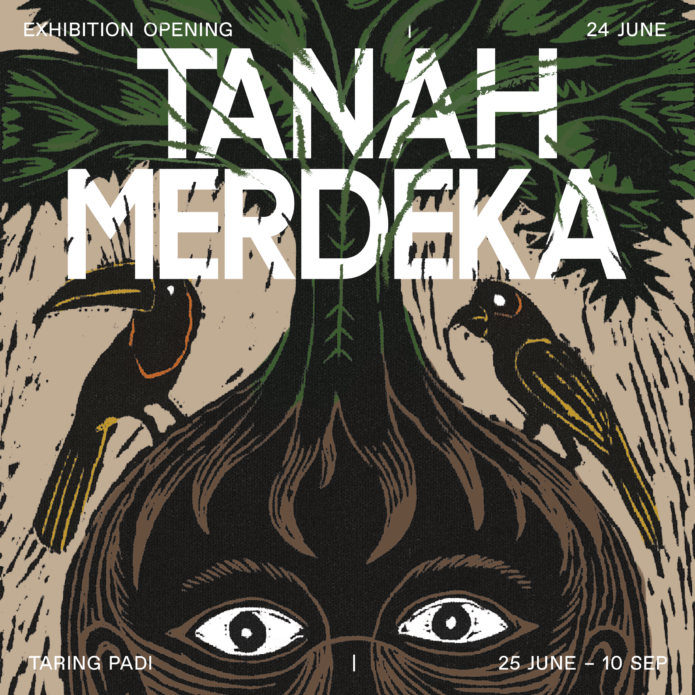
Exhibition: Tanah Merdeka
An exhibition with the Indonesian art & activist collective, Taring Padi, reflecting on the concept of land as the object and site of decolonial struggles.
Agenda
Finissage: Tanah Merdeka
The last day of the exhibition, with a guided tour in Bahasa Indonesia, a performance by Samboleap Tol, and a painting & woodcut printmaking workshop with Taring Padi members
Workshop: Linocut Printmaking – Tanah Merdeka
Co-creating a lino print poster with Sophia Pekowsky & Ilya Genov to reflect on transnational solidarity and land struggles
Opening: Tanah Merdeka
Opening of the exhibition Tanah Merdeka with works by the Indonesian art collective Taring Padi and collaborators.
Roundtable Conversation: Tanah Merdeka
Roundtable conversation with researchers and curators from different art museums and institutions within the context of Taring Padi's exhibition, Tanah Merdeka.
Network
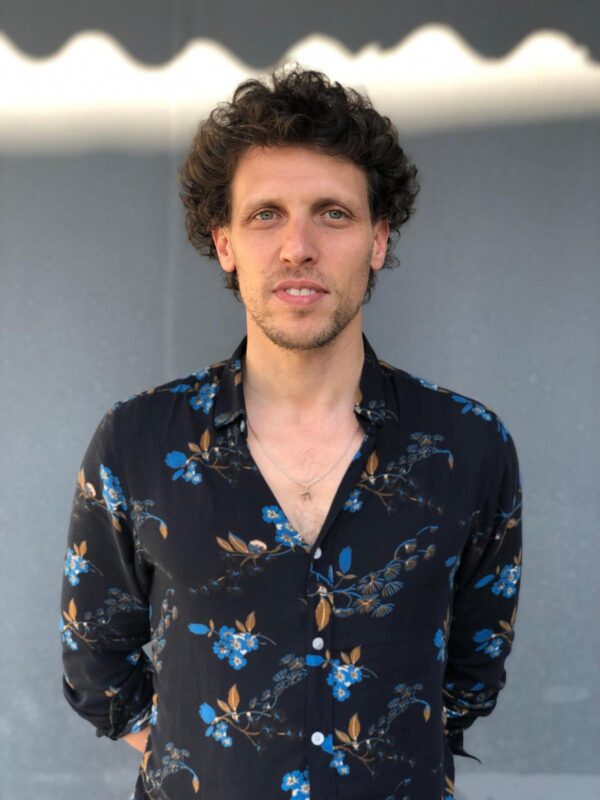
Benjamin Seroussi
Curator

